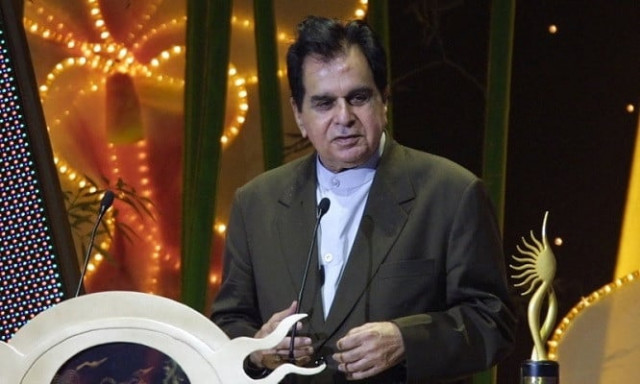Dilip Kumar, Bollywood's 'tragedy king', dies aged 98
The Bollywood veteran's death prompts tributes from across Indian cinema and politics

Dilip Kumar, one of Bollywood's most accomplished and respected film stars, died on Wednesday aged 98, prompting tributes from across Indian cinema and politics.
With Dev Anand and Raj Kapoor, Kumar was one of the three big names who dominated the golden age of Indian cinema from the 1940s to the 1960s, enjoying a career spanning more than 50 years and nearly 60 films.
Nicknamed "The Tragedy King" because of his brooding good looks, tousled hair and deep voice, he played the lead in some of the Indian film industry's most commercially successful films of the period.
But he missed out on international fame after famously turning down the chance to play Sherif Ali in David Lean's 1962 classic "Lawrence of Arabia". The part went to then little known Egyptian actor Omar Sharif.
Kumar was born Mohammed Yusuf Khan on December 11, 1922, in Peshawar, Pakistan, then part of British-ruled India. His father was a fruit merchant who took his family to India's entertainment capital in the 1930s.
But the son turned his back on the chance to take over the business when actress Devika Rani spotted him on his father's fruit stall in the then Bombay, leading to a part in his first film, "Jwar Bhata", in 1944.
Rani persuaded him to change his name, so he chose Dilip Kumar, allowing him to hide what he was doing from his disapproving father.
Read: Bollywood actor Asif Basra found dead
Although "Jwar Bhata" flopped and leading film magazines criticised his performance, Kumar was undeterred and eventually broke through with the 1946 film "Milan".
One of his most remembered roles was in the lavish historical romance "Mughal-e-Azam", based on the life of one of India's great Mughal princes.
The movie, released in 1960, was eight years in the making and cost a mind-boggling 15 million rupees, but soon became one of Bollywood's biggest-grossing films of all time.
Kumar, who cited Hollywood greats Marlon Brando, Gary Cooper and Spencer Tracy as influences, later won acclaim in 1964 for the nationalistic "Leader", screened against a backdrop of recent wars against China and Pakistan.
The 1970s saw fewer roles, as younger actors like Amitabh Bachchan took centre stage.
He even took a five-year break after a string of flops, returning in 1981 with the hit "Kranti" (Revolution) and a part alongside Bachchan in "Shakti" (Strength) the following year, plus a string of character roles.
Actor and lawmaker
After a series of badly-received films, Kumar took up a more active role in politics in 1998 and worked to end the feuding between India and Pakistan.
The same year saw him receive the highest civilian honour in Pakistan, angering Hindu nationalists. Two years later he became a lawmaker for the then-opposition Congress party.
The ancestral homes of Kumar and other actors in Peshawar suffered decades of neglect but efforts are being made to restore them as the city emerges from years of militancy.
Unlike many actors who appeared in hundreds of films, the versatile Kumar carefully selected roles which by Indian standards only increased his stature in the fiercely competitive industry.
In 2006 he accepted a lifetime achievement award at India's National Film Awards in recognition of his contribution to Indian cinema.
Yet he still admitted that he was baffled at his success.
"Honestly, I've still to figure out how an intensely shy young man called Yusuf Khan became the actor Dilip Kumar," he told The Hindustan Times in an interview to mark his 85th birthday.
Kumar, who had struggled with ill health in recent years, married the actress Saira Banu in 1966 when she was 22 years his junior.
Read more: Veteran Bollywood actor Jagdeep passes away at 81
His death was announced on Twitter "with a heavy heart and profound grief" by family friend Faisal Farooqui.
With a heavy heart and profound grief, I announce the passing away of our beloved Dilip Saab, few minutes ago.
— Dilip Kumar (@TheDilipKumar) July 7, 2021
We are from God and to Him we return. - Faisal Farooqui
Prime Minister Narendra Modi called Kumar "a cinematic legend".
"He was blessed with unparalleled brilliance... His passing away is a loss to our cultural world," Modi tweeted.
Dilip Kumar Ji will be remembered as a cinematic legend. He was blessed with unparalleled brilliance, due to which audiences across generations were enthralled. His passing away is a loss to our cultural world. Condolences to his family, friends and innumerable admirers. RIP.
— Narendra Modi (@narendramodi) July 7, 2021
Bollywood superstar Akshay Kumar said: "To the world many others may be heroes. To us actors, he was The Hero."
To the world many others may be heroes. To us actors, he was The Hero. #DilipKumar Sir has taken an entire era of Indian cinema away with him.
— Akshay Kumar (@akshaykumar) July 7, 2021
My thoughts and prayers are with his family. Om Shanti 🙏🏻 pic.twitter.com/dVwV7CUfxh
Ajay Devgan tweeted that Kumar was an "institution, a timeless actor. Heartbroken." Director Hansal Mehta called him "the greatest".
Shared many moments with the legend...some very personal, some on stage. Yet, nothing really prepared me for his passing away. An institution, a timeless actor. Heartbroken.
— Ajay Devgn (@ajaydevgn) July 7, 2021
Deepest condolences to Sairaji🙏🏼#DilipKumar pic.twitter.com/Il8qaMOOhf



















COMMENTS
Comments are moderated and generally will be posted if they are on-topic and not abusive.
For more information, please see our Comments FAQ